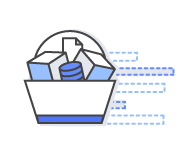Amazon Relational Database Service (Amazon RDS) makes it easy to set up, operate, and scale a relational database in the cloud. It provides cost-efficient and resizable capacity while automating time-consuming administration tasks such as hardware provisioning, database setup, patching and backups. It frees you to focus on your applications so you can give them the fast performance, high availability, security and compatibility they need.
Amazon RDS is available on several database instance types - optimized for memory, performance or I/O - and provides you with six familiar database engines to choose from, including Amazon Aurora, PostgreSQL, MySQL, MariaDB, Oracle, and Microsoft SQL Server. You can use the AWS Database Migration Service to easily migrate or replicate your existing databases to Amazon RDS.

Web and mobile applications that are built to operate at very large scale need a database with high throughput, massive storage scalability, and high availability. Amazon RDS fulfills the needs of such highly demanding applications with room for future growth. Since Amazon RDS does not have any licensing constraints, it perfectly fits the variable usage pattern of these applications.
Airbnb chose Amazon RDS because it simplifies much of the time-consuming administrative tasks typically associated with databases. Airbnb uses Multi-Availability Zone (Multi-AZ) deployment to further automate its database replication and augment data durability. Airbnb was able to complete its entire database migration to Amazon RDS with only 15 minutes of downtime.
Amazon RDS offers small and large ecommerce businesses a flexible, secured, highly scalable, and low-cost database solution for online sales and retailing. Amazon RDS provides a managed database offering helping ecommerce companies meet PCI compliance and focus on building high quality customer experiences without worrying about managing the underlying database.
To avoid the complexities of building a new production database from scratch, Instacart turned to Amazon RDS for their new same-day grocery delivery service. The company can now add millions of new items to its database every month and its engineering team can focus on developing new features and improving the overall customer experience.
Mobile and Online games need a database platform with high throughput and availability. Amazon RDS manages the database infrastructure so game developers don’t have to worry about provisioning, scaling, or monitoring database servers. Amazon RDS provides familiar database engines that can rapidly grow capacity to meet user demand.
Bandai Namco Studios uses Amazon RDS to provide better performance, lower costs, better security, and greater availability for their arcade, social and mobile games. Bandai Namco saw the benefit in terms of reductions in overhead, especially when it came to adding, modifying, and removing server resources.
It's easy to get started with Amazon RDS. Follow the Getting Started Guide to create your first Amazon RDS instance with just a few clicks.
The AWS Free Tier for Amazon RDS includes 750hrs of Micro DB Instance each month for one year, 20GB of Storage, and 20GB for Backups.




























